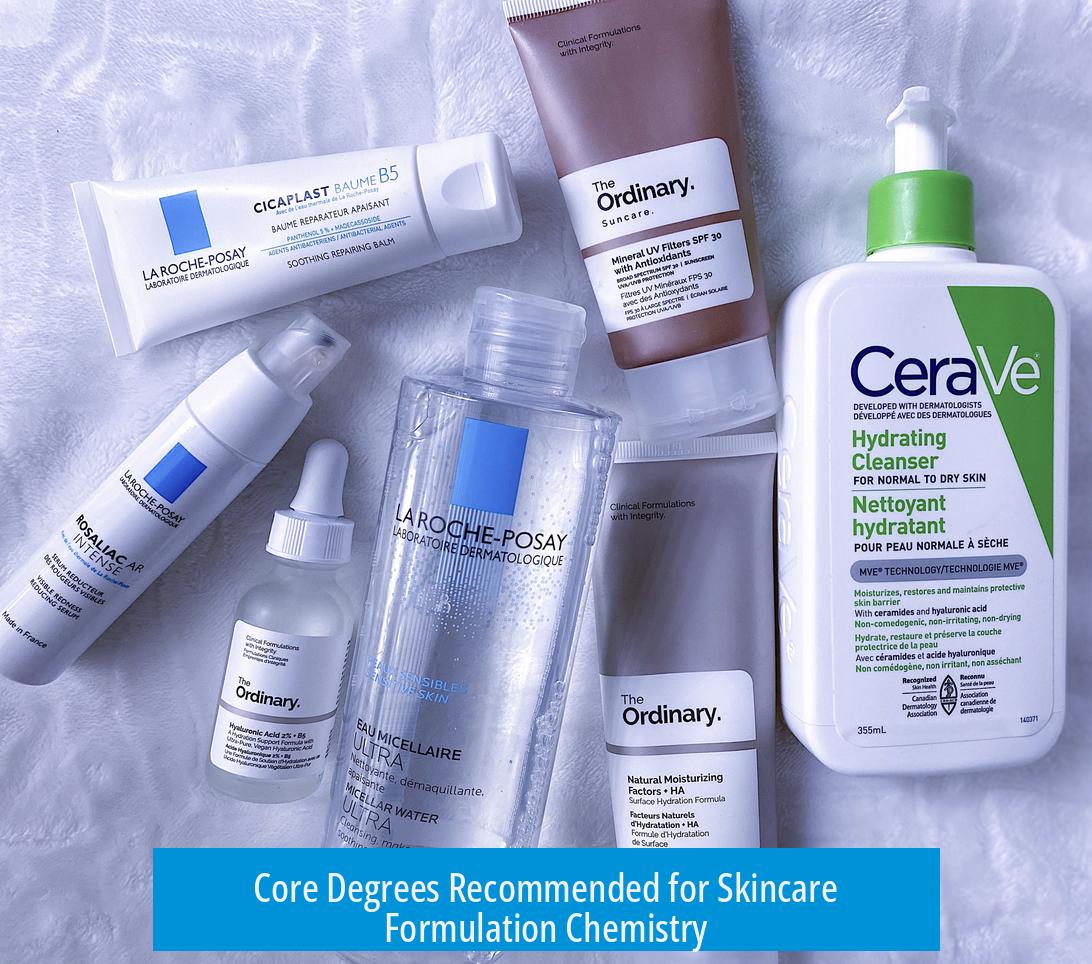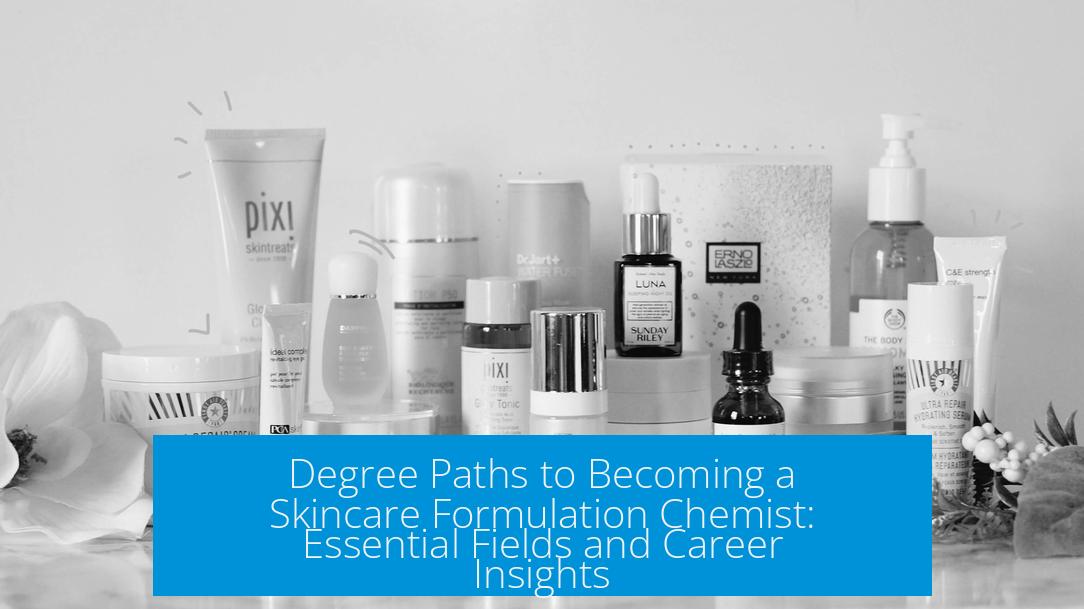Which Degree Should I Take to Be a Skincare Formulation Chemist?
To become a skincare formulation chemist, the most suitable degrees are in chemistry or biochemistry. A background in these fields provides essential knowledge of chemical properties, interactions, and laboratory skills necessary for creating skincare products. Supplementing this foundation with relevant work experience or specialized graduate studies in cosmetic science enhances career prospects.
Core Degrees Recommended for Skincare Formulation Chemistry

Chemistry and Biochemistry
Degrees in chemistry or biochemistry offer the fundamental scientific principles to prepare for skincare formulation roles. These programs cover organic chemistry, physical chemistry, analytical methods, and biochemical processes.For instance, many professionals in the personal care industry hold degrees in pure chemistry or biochemistry. Working formulation chemists often share backgrounds in these disciplines.
- Organic chemistry enables understanding of molecular structures and reactions key to cosmetic ingredient function.
- Biochemistry explains biological interactions affecting skin and how active ingredients behave.
- Laboratory courses build hands-on skills for formulating and testing products systematically.
Some individuals pursue further specialization, such as master’s degrees in cosmetic science, enhancing formulation expertise and industry knowledge.
Chemical Engineering: A Related but Distinct Path
Chemical engineering focuses more on process engineering and the large-scale manufacturing of products rather than formulation science itself. The field involves physics, higher-level math, and designing equipment that mixes ingredients industrially.
“Chem engineering is more along the lines of making the machines that mix the ingredients on an industrial scale.”
“Definitely not chemical engineering; it’s more physics and math than chemistry.”
This distinction is critical: those aiming to design formulas and develop cosmetic products should prioritize chemistry or biochemistry. Chemical engineering suits those interested in production and scale-up.
Alternative and Specialized Fields
Industrial and Physical Pharmacy
Some graduate schools offer programs in industrial or physical pharmacy, focusing on formulation science applied to pharmaceuticals and personal care products. These fields cover the design, manufacture, and physical properties of dosage forms, overlapping with skincare formulation principles.
For example, Purdue University provides a PhD program in Industrial and Physical Pharmacy that emphasizes formulation science and product design.
- Purdue Industrial and Physical Pharmacy PhD Program
- This path suits candidates interested in the physical chemistry of formulations and pharmaceutical applications.
Surface and Materials Chemistry
Advanced study in surface chemistry or materials science can be highly relevant to skincare, especially in developing novel delivery systems and understanding ingredient interactions at interfaces. PhD theses in these areas have led researchers to leading roles in cosmetic companies.
A notable example is a researcher specializing in supramolecular chemistry, studying molecular assemblies and interactions critical in formulation innovation.
The Role of Work Experience and Career Entry Points
Formal education alone rarely guarantees entry into skincare formulation roles. The cosmetic industry values laboratory experience, research skills, and practical knowledge.
- Positions such as lab technician, analytical chemist, or R&D chemist provide valuable industry experience.
- Hands-on work developing and testing formulations builds core competencies and industry familiarity.
- Internships or entry-level jobs at skincare companies allow exposure to formulation processes and company expectations.
Industry insiders emphasize cultivating lab experience alongside education. Secrecy is common in formulation science, so getting into the field often requires demonstrated laboratory proficiency.
“That industry is very secretive. I believe they recruit people with a chemistry or other sciences background, and teach them what they need to know. I imagine a history of lab experience would be most valuable.”
Educational Resources and Degree Programs
Undergraduate Programs Focused on Cosmetic Science
Some universities now offer undergraduate programs directly related to cosmetic science and formulation design. Such specialized courses integrate chemistry knowledge with practical formulation skills designed for personal care and cosmetics industries.
- Example: The University of Toledo offers a Cosmetic Science and Formulation Design program.
Graduate Programs in Cosmetic Science
Graduate degrees focusing explicitly on cosmetic science help deepen expertise in formulation chemistry, regulatory issues, and product development.
- Common master’s programs include coursework in ingredient functionality, stability testing, and skin biology.
- International Federation of Societies of Cosmetic Chemists (IFSCC) provides a list of recognized cosmetic science degree programs worldwide.IFSCC Cosmetic Science Degree Programs
Career Focus Within the Cosmetic Industry
The distinction between formulation chemistry and chemical engineering clarifies career pathways.
- Chemistry and Biochemistry: Ideal for developing and optimizing product formulas.
- Chemical Engineering: Suited for scaling production and designing manufacturing processes.
Choosing the right degree depends on whether the goal is hands-on formulation work or overseeing product manufacturing and process design.
Summary of Degree Choices for Skincare Formulation Chemists
| Degree | Focus | Relevance to Skincare Formulation | Career Role Example |
|---|---|---|---|
| Chemistry | Chemical properties, reactions, lab skills | High – Formulation chemist | R&D Formulation Chemist |
| Biochemistry | Biological processes, molecular interactions | High – Formulation chemist | Cosmetic Scientist |
| Chemical Engineering | Process design, equipment, scale-up | Low – Manufacturing roles, not formulation | Production Engineer |
| Industrial/Physical Pharmacy | Formulations, dosage forms, physical chemistry | Medium – In-depth formulation science | Pharmaceutical/Cosmetic Formulator |
| Surface/Materials Chemistry (PhD) | Molecular interactions, advanced formulation technology | Specialized roles in innovation | Lead Researcher in Cosmetic Company |
Key Takeaways
- Degrees in chemistry or biochemistry provide the best foundation for skincare formulation chemistry.
- Chemical engineering is less relevant for formulation, focusing instead on manufacturing processes.
- Experience in laboratory or research settings complements education and is essential for employment.
- Specialized programs in cosmetic science or industrial pharmacy offer targeted knowledge for career advancement.
- Graduate studies and certifications improve expertise and competitiveness in the skincare industry.
What is the best degree to become a skincare formulation chemist?
A degree in chemistry or biochemistry is most suited for skincare formulation. These fields cover the science behind ingredients and how they interact in products.
Is chemical engineering a good choice for skincare formulation?
Chemical engineering focuses more on industrial processes and machines. It is less about creating formulas and more about scaling production.
Are there specialized degrees in cosmetic science?
Yes, some universities offer degrees or masters in cosmetic science. These programs focus directly on skincare formulation and product development.
Can related fields like pharmacy help in this career?
Industrial and physical pharmacy are related paths. They cover drug formulation and product design, which overlap with skincare chemistry.
How important is work experience for a skincare formulation chemist?
Work experience is crucial. Lab or research work teaches practical skills. Entry-level jobs like lab technician or R&D chemist help build relevant experience.
Can advanced degrees benefit a career in skincare formulation?
Advanced degrees such as a PhD in surface or materials chemistry can lead to specialized research roles in cosmetic companies. They deepen knowledge in formulation science.





Leave a Comment